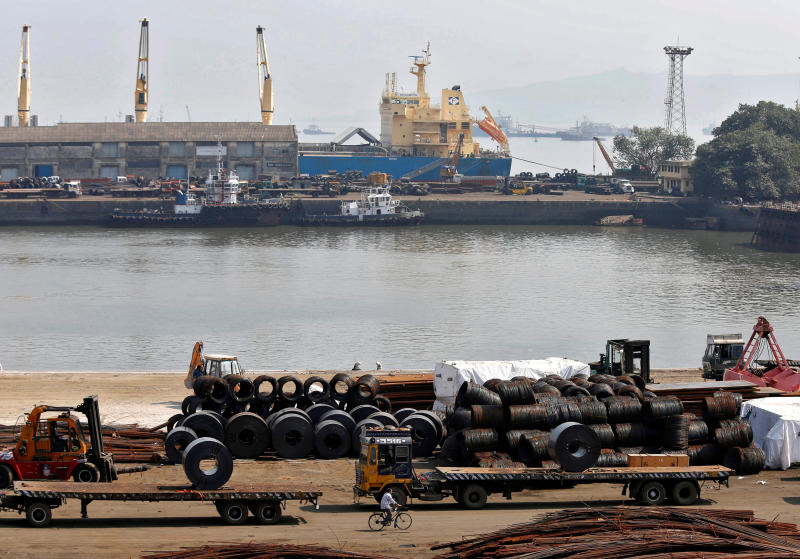Not in India's national interest to be left out of RCEP trade deal: Tommy Koh
Sign up now: Get ST's newsletters delivered to your inbox

Reports a fortnight ago suggested that India was considering withdrawing from the trade pact, which would cover nearly half of the world's economy.
PHOTO: REUTERS
SINGAPORE - While India's hesitation over the Regional Comprehensive Economic Partnership is understandable, it is not in its national interest to be left out of the mega trade deal, veteran diplomat Tommy Koh told a public forum on Tuesday (Aug 28).
His comments come after reports a fortnight ago suggested that India was considering withdrawing from the trade pact, which would cover nearly half of the world's economy.
India is seeking more concessions on services and is wary of widening its trade deficit with China.
But Professor Koh urged India to overcome its misgivings and seal the Asean-led trade deal, which is being negotiated between Asean and its six major trading partners - Australia, China, India, Japan, New Zealand and South Korea.
Singapore and others hope to conclude negotiations - which began in 2012 - by the end of the year.
India has faced flak for holding up negotiations.
Professor Koh acknowledged India's misgivings in his opening comments at the 11th India-Singapore Strategic Dialogue, an annual meeting between Singaporean and Indian think-tanks which he has chaired for 10 years.
India fears that the RCEP will worsen its trade deficit with China, which was US$51 billion (S$70 billion) in the 2016-17 fiscal year.
The ambassador-at-large said: "They feel they've opened their markets to Chinese exports and China has not reciprocated.
"India is also unhappy we're liberalising trade in goods more than trade in services, and India is more competitive in services than goods."
India wants more of its skilled professionals to be allowed to work in RCEP member countries, but this proposal has met with opposition.
Prof Koh added: "We would appeal to you to think strategically and to think long-term. It is not in the national interest of India to be left out of the mega trade deal."
Other members of the forum panel did not comment on the issue, but analysts told The Straits Times that India's absence would be a significant loss.
Dr Amitendu Palit, a senior research fellow at the National University of Singapore's Institute of South Asian Studies (Isas) said the RCEP's market size would shrink without India, the third largest economy in the deal after China and Japan.
India also has one of the highest GDP growth rates among RCEP members, along with fast growth of middle class consumers, he added.
But India is seeking concessions in exchange for lowering tariffs under the RCEP, which will be a bitter pill for its producers to swallow.
India is less competitive than most RCEP members in manufacturing mostly due to its higher business costs, said Dr Palit.
Indian producers realise that cheaper imports under the RCEP would make them uncompetitive in the domestic market, and are lobbying the government to retain tariffs that protect them, Dr Palit said.
"From a negotiating perspective, if India lowers tariffs and exposes its industry to more imports despite internal opposition, it would like to get a concession in RCEP, which is politically and economically acceptable to domestic constituencies," he added.
"As a result, it is demanding more liberal rules for movement of its skilled professionals to RCEP member countries. This way, RCEP can be said to be creating jobs and income-generating through concessions in services, even if India lowers tariffs on imports."
ISAS visiting research fellow Rupakjyoti Borah noted that India is traditionally strong in the services sector, which has been a key driver of India's economic growth including areas such as hotels and restaurants, transport, storage and communication, financing, insurance and real estate.
But he noted that India said during this year's Delhi Dialogue in July that it was committed to negotiations for an early and satisfactory conclusion of the RCEP.
Signing the RCEP would also be the next step in India's growing economic engagement with Asean and Japan, he said.
"Hence, the issue of RCEP without India does not arise," he added.
But he noted that India said during this year's Delhi Dialogue in July that it was committed to negotiations for an early and satisfactory conclusion of the RCEP.
Signing the RCEP would also be the next step in India's growing economic engagement with Asean and Japan, he said.
"Hence, the issue of RCEP without India does not arise," he added.


